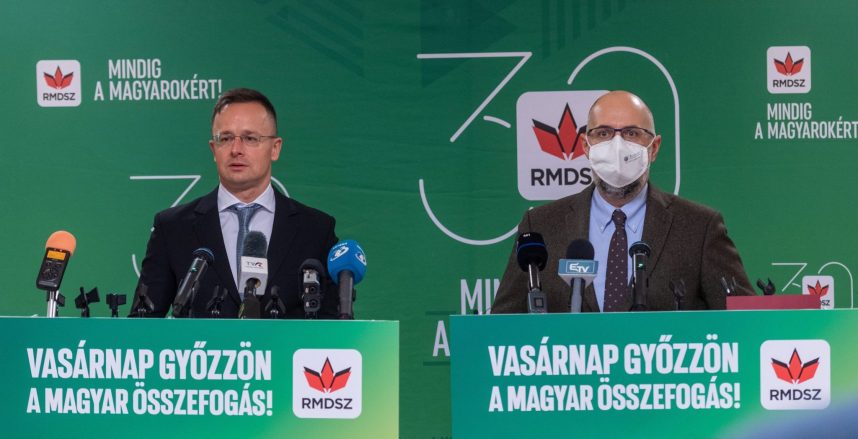
Hungarian-language media in Romania are to lay off scores of staff as the government in Hungary, which sponsors them, feels the financial pinch.

Hungarian Foreign and Trade Minister Peter Szijjarto (L) and the President of the Democratic Alliance of Hungarians in Romania, Hunor Kelemen (R), n Targu Mures, Romania,, December 2, 2020. Photo: EPA-EFE/Gabor Kiss
Two-thirds of the journalists working at the Mediater Association, through which Hungary’s ruling FIDESZ party led by Viktor Orban finances much of the Hungarian-language media in Romania, will be fired at the end of next month.
The reason for the mass layoffs is a financial crisis, amplified by the energy crisis that Hungary is going through.
The group of companies operated by Mediater Association will make layoffs in the editorial offices of the print newspapers, online, and within the radio stations they control.
Also, new staff layoffs are forecast for 2023.
Investigative media from Romania and Hungary have reported that the Orban government pumped more than 20 million euros in recent years into the Hungarian-language media in Romania’s Transylvania region after the Democratic Union of Hungarians in Romania, UDMR, the main Hungarian party in the country, agreed for the Orban executive to finance these publications.
The history of the Hungarian press trust in Transylvania began in 2018, when the company Udvarhelyi Híradó SRL, led by the Hungarian oligarch Lajos Simicska, went bankrupt. Simicska was the Fidesz oligarch in charge of the party’s finances and a former roommate of Orbán’s, but the two fell out.
Mediater Association was founded in 2013 in Salard village, Bihor county, northwest Romania, becoming one of Romania’s most influential players in the media market.
In recent years, the association took ownership of various companies, publishing houses, radio stations and local TV license holders.
The Budapest government has approved 2020-2021 funding of around half a billion euros to Hungarian communities outside Hungary’s borders. This was done mainly through the Bethlen Gábor Fund, a Hungarian state foundation.
A large part of this money from this budget went to the Hungarian community in Transylvania through foundations or associations run by close associates of the UDMR leadership.
The European Commission on September 18 pledged to cut 7.5 billion euros in joint EU funding to Hungary amid concerns about corruption and democratic backsliding in Budapest.
Orban’s rhetoric in favour of Russia and his view fn the Russian invasion of Ukraine have further worried Brussels.
Pro-government media in Hungary experienced unprecedented lay-offs and closures after Orban’s Fidesz party won a fourth consecutive general election win in April.
Several magazines, dailies and a TV station were closed down or merged. The biggest losers in the reorganisation were county newspapers, where many journalists were fired.